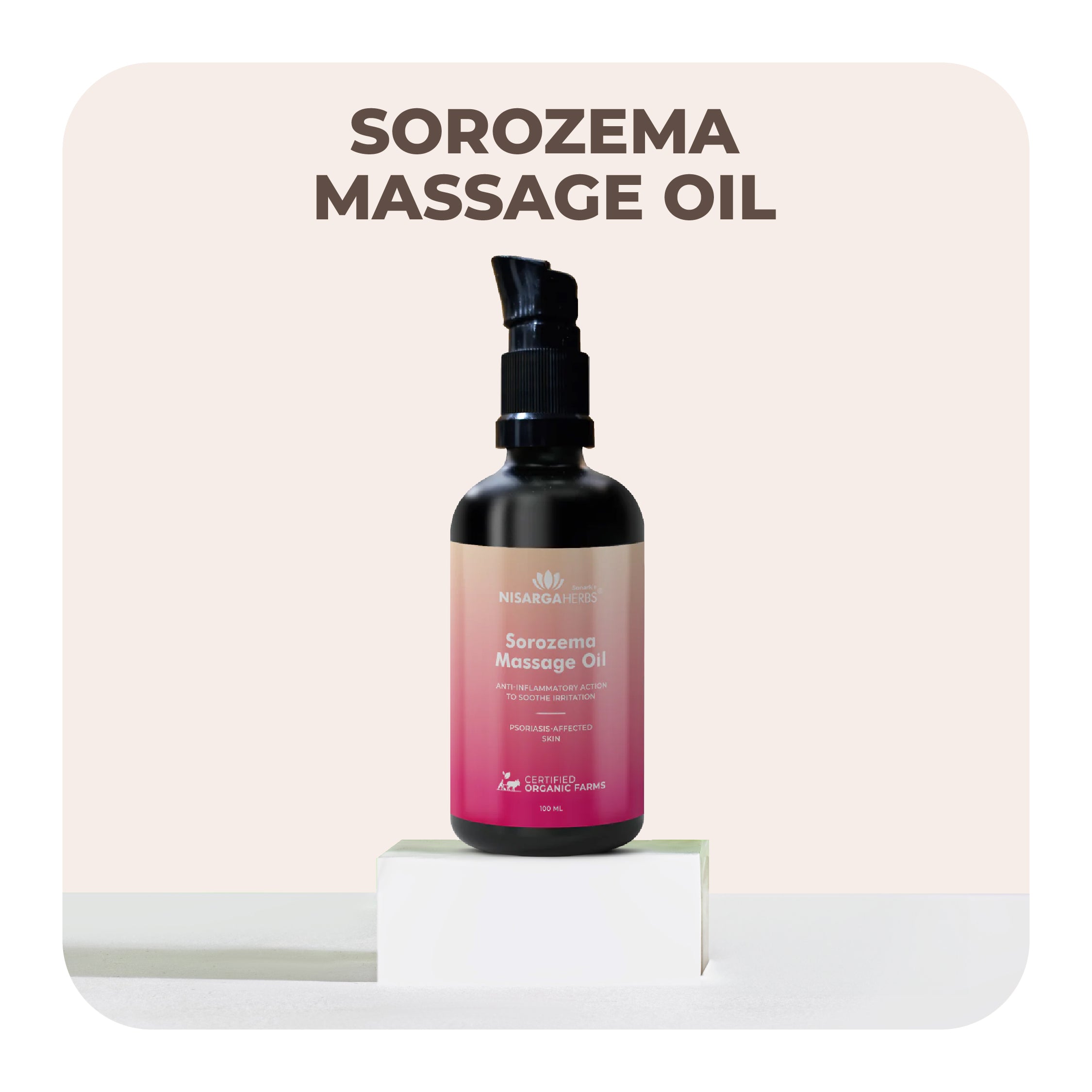Daily Habits Likely to Worsen Your Psoriasis Symptoms

Living with psoriasis can be challenging—but when joint pain enters the picture, it may point to a deeper condition: psoriatic arthritis. As experts in Ayurvedic healing, we at Nisarga Herbs understand the connection between skin and joint health, and how imbalances in the body can manifest as both external rashes and internal inflammation.
In this article, we explore the early signs of psoriatic arthritis, common psoriatic arthritis symptoms and signs, and how Ayurveda offers gentle, holistic ways to manage flare-ups, improve mobility, and protect your quality of life.
What is Psoriatic Arthritis?
Psoriatic arthritis (PsA) is a chronic autoimmune condition that combines the effects of psoriasis (skin inflammation) with arthritis (joint inflammation). It may affect the joints, skin, and even nails, making daily tasks painful and exhausting.
Unlike regular arthritis, psoriatic arthritis often appears after or alongside a psoriasis rash. But for some, joint symptoms can come first, making early diagnosis tricky.
Psoriatic Arthritis Symptoms and Signs to Watch For
1. Joint Pain and Swelling
- Painful or tender
- Warm to the touch
- Stiff after periods of rest
This pain can worsen during a psoriatic arthritis flare-up.
2. Morning Stiffness
One of the psoriatic arthritis early symptoms is stiffness, particularly after waking up. It may take more than 30 minutes for your joints to "loosen up".
3. Psoriatic Arthritis Rash
- Raised red patches with silvery scales
- Flare-ups on the scalp, elbows, or knees
- Itchy or burning skin
4. Swollen Fingers and Toes (Dactylitis)
A very distinctive sign is "sausage digits"—when entire fingers or toes become swollen and painful due to inflammation.
5. Nail Changes
- Pitting (small dents)
- Discoloration
- Separation of the nail from the nail bed
These are often overlooked but are vital signs of psoriatic arthritis.
6. Fatigue and Low Energy
Chronic inflammation drains the body's energy. You may feel tired, even without heavy activity.
7. Pain in the Feet and Hands
Look for early signs of psoriatic arthritis in feet and hands, like:
- Heel pain (plantar fasciitis)
- Aching in the arches or wrists
- Difficulty walking due to joint discomfort
Early Diagnosis is Crucial
A timely psoriatic arthritis diagnosis can prevent long-term joint damage. If you notice any of the above symptoms—especially with a history of psoriasis—consult a rheumatologist. Ayurvedic consultation can also help detect imbalances (dosha vikaras) that may contribute to inflammation.
What Triggers a Psoriatic Arthritis Flare-Up?
- Stress: Aggravates both joint pain and skin symptoms
- Cold weather: Can tighten muscles and stiffen joints
- Infection or skin injury: May trigger immune overreaction
- Poor diet: Especially inflammatory foods (fried, processed, sugary)
- Lack of sleep: Affects recovery and increases pain sensitivity
Ayurvedic Insight: Healing from Within
According to Ayurveda, psoriatic arthritis is a result of imbalanced Vata and Pitta doshas. When these doshas accumulate, they disrupt the body's natural harmony, leading to joint inflammation, skin irritation, and systemic pain.
Nisarga Herbs’ Approach
- Purifying the blood (Rakta Shodhana)
- Reducing inflammation (Shothahara)
- Nourishing joints (Sandhi Poshan)
- Soothing skin (Twacha Shamana)
Herbal Support: Sorozema Oil by Nisarga Herbs
Sorozema Oil is a trusted Ayurvedic remedy for psoriasis and psoriatic arthritis-related rashes. It’s formulated with herbal extracts that:
- Calm skin irritation
- Reduce joint inflammation
- Nourish the tissues beneath the skin
- Prevent psoriasis rash flare-ups
How to Use:
- Apply directly to affected areas
- Massage gently into the skin
- Use twice daily for best results
Unlike many sticky oils, Sorozema Oil is non-greasy and quickly absorbed, making it ideal for daily use.
Lifestyle Practices That Support Healing
1. Eat the Right Foods
Include: Fresh fruits, vegetables, turmeric, amla, flaxseeds, barley
Avoid: Nightshades (tomatoes, potatoes), red meat, dairy, refined sugars
2. Stay Active Gently
- Yoga and joint-friendly exercises reduce stiffness
- Regular movement prevents flare-ups
3. Manage Stress
- Practice pranayama, meditation, or light walks
- Sleep early and maintain a routine
4. Protect Your Skin and Joints
- Use natural skincare and avoid harsh soaps
- Keep the skin hydrated with herbal moisturizers
- Wear gloves when cleaning or cooking
Conclusion
Understanding the psoriatic arthritis symptoms and signs is the first step toward healing. Whether you're seeing the early signs in your hands or feet, or experiencing a full psoriatic arthritis flare-up, you don't have to manage it alone.
Through an Ayurvedic lifestyle, mindful routines, and trusted remedies like Nisarga Herbs’ Sorozema Oil, you can nourish your body, calm inflammation, and regain comfort in everyday life.
Nisarga Herbs blends ancient Ayurvedic wisdom with modern care. Our remedies support your journey naturally—because healing should always come from within.
FAQs
Q1: Can psoriatic arthritis affect people without visible psoriasis?
Yes, some people develop joint symptoms before skin symptoms appear.
Q2: What is the difference between rheumatoid arthritis and psoriatic arthritis?
Psoriatic arthritis is linked with psoriasis and may involve nail changes, rash, and dactylitis, which are less common in RA.
Q3: Is there an Ayurvedic cure for psoriatic arthritis?
While Ayurveda doesn’t claim to "cure", it offers deep, holistic relief by addressing root causes and supporting the immune system.
Q4: Can diet really help with psoriatic arthritis?
Yes. Anti-inflammatory diets rich in omega-3s, fresh produce, and Ayurvedic herbs can reduce symptoms and flare-ups.


 Mental Wellness
Mental Wellness
 Vital Organ Wellness
Vital Organ Wellness
 Skin Wellness
Skin Wellness
 Immunity Wellness
Immunity Wellness
 Sexual Health
Sexual Health
 Bones Wellness
Bones Wellness
 Daily Wellness
Daily Wellness
 Kids Wellness
Kids Wellness
 Diabetes Wellness
Diabetes Wellness




